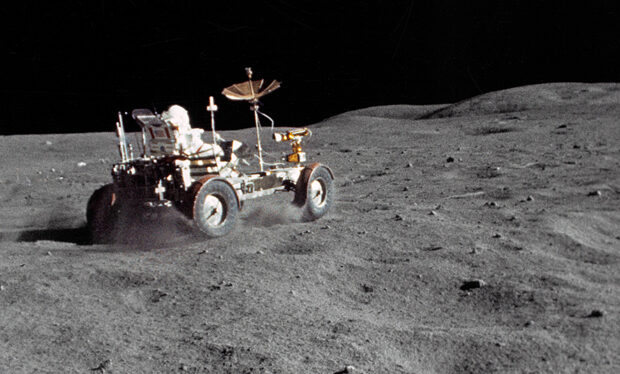3 min read
Preparations for Next Moonwalk Simulations Underway (and Underwater)
Moon dust, or regolith, isn’t like the particles on Earth that collect on bookshelves or tabletops – it’s abrasive and it clings to everything. Throughout NASA’s Apollo missions to the Moon, regolith posed a challenge to astronauts and valuable space hardware.
During the Apollo 17 mission, astronaut Harrison Schmitt described his reaction to breathing in the dust as “lunar hay fever,” experiencing sneezing, watery eyes, and a sore throat. The symptoms went away, but concern for human health is a driving force behind NASA’s extensive research into all forms of lunar soil.
The need to manage the dust to protect astronaut health and critical technology is already beneficial on Earth in the fight against air pollution.
Working as a contributor on a habitat for NASA’s Next Space Technologies for Exploration Partnerships (NextSTEP) program, Lunar Outpost Inc. developed an air-quality sensor system to detect and measure the amount of lunar soil in the air that also detects pollutants on Earth.
Originally based in Denver, the Golden, Colorado-based company developed an air-quality sensor called the Space Canary and offered the sensor to Lockheed Martin Space for its NextSTEP lunar orbit habitat prototype. After the device was integrated into the habitat’s environmental control system, it provided distinct advantages over traditional equipment.
Rebranded as Canary-S (Solar), the sensor is now meeting a need for low-cost, wireless air-quality and meteorological monitoring on Earth. The self-contained unit, powered by solar energy and a battery, transmits data using cellular technology. It can measure a variety of pollutants, including particulate matter, carbon monoxide, methane, sulfur dioxide, and volatile organic compounds, among others. The device sends a message up to a secure cloud every minute, where it’s routed to either Lunar Outpost’s web-based dashboard or a customer’s database for viewing and analysis.
The oil and gas industry uses the Canary-S sensors to provide continuous, real-time monitoring of fugitive gas emissions, and the U.S. Forest Service uses them to monitor forest-fire emissions.
“Firefighters have been exhibiting symptoms of carbon monoxide poisoning for decades. They thought it was just part of the job,” explained Julian Cyrus, chief operating officer of Lunar Outpost. “But the sensors revealed where and when carbon monoxide levels were sky high, making it possible to issue warnings for firefighters to take precautions.”
The Canary-S sensors exemplify the life-saving technologies that can come from the collaboration of NASA and industry innovations.
Share
Details
Related Terms
https://www.nasa.gov/technology/tech-transfer-spinoffs/measuring-moon-dust-to-fight-air-pollution-2/










